The earnings management practice
This is an assessment booklet for the Advanced Diploma of Accounting course at the International Institute of Technology. Students are required to answer short answer questions and reference their answers correctly.
22 Pages3655 Words16 Views
Added on 2022-09-01
The earnings management practice
This is an assessment booklet for the Advanced Diploma of Accounting course at the International Institute of Technology. Students are required to answer short answer questions and reference their answers correctly.
Added on 2022-09-01
ShareRelated Documents
Advanced Diploma
of Accounting
Student
Assessment Booklet
Name:
Date:
Manual Version Number:
1
International Institute of Technology © VR20717
Registered Training Organisation 21421
of Accounting
Student
Assessment Booklet
Name:
Date:
Manual Version Number:
1
International Institute of Technology © VR20717
Registered Training Organisation 21421
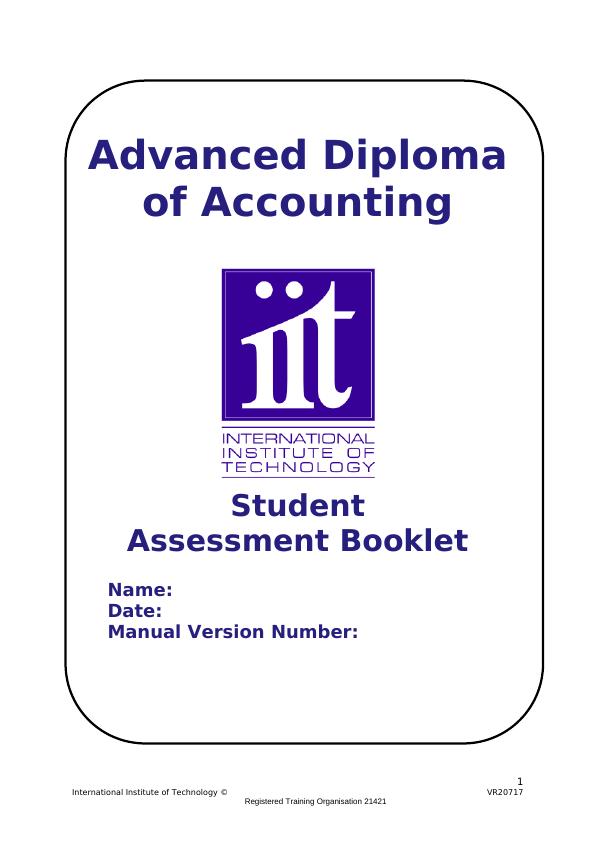
ADACC – Chapter 8
Please note: It is a requirement for students to make their submissions using
this electronic assessment booklet. At the facilitator’s discretion any
submissions made in another format may not be accepted. If you are
completing the course via various computers, please save the one booklet on a
USB so you can send the submission in using the one file
Getting Started
Please insert your NAME, DATE and the Manual Version Number on the first
page of your Assessment Booklet.
Answering Assessment Questions
Each Assessment Booklet contains blank spaces for following assessment items:
Short Answer Questions
When submitting Assessment Booklets for marking, please ensure that the entire
booklet is completed.
Short Answer Questions
Using the space/s provided, please complete your answers making sure to:
Please restrict your answers to no more than 300 words per question
Please include any calculations that you used to reach your answer
Referencing Your Answers
Students undertaking the course must exhibit a range of skills in order to be
confirmed as competent in their course. These skills include:
Understanding a question.
Possessing knowledge about the issue, which in some assessments
includes locating information from references.
Providing an answer, this shows personal understanding.
Please make sure that all assessments are documented in a way that
exhibits your personal study and/or research. To that end would you
please acknowledge all material and sources used in the presentation of your
assessment whether they are books, articles, reports, Internet searches, or any
other document or personal communication. For example if:
An idea is sourced; reference it e.g. (Bagra 2010).
You are directly quoting, wrap it in quote marks e.g. “Tom Horner sat in a
corner” (Peters 2007 page 7).
You are quoting from the internet include quote marks and the web
reference e.g. “ban on conflicted remuneration structures including
commissions” <http://futureofadvice.treasury.gov.au/content/Content.asp
x?doc=reforms.htm> accessed on the 28th of December 2012.
2
International Institute of Technology © VR20717
Registered Training Organisation 21421
Please note: It is a requirement for students to make their submissions using
this electronic assessment booklet. At the facilitator’s discretion any
submissions made in another format may not be accepted. If you are
completing the course via various computers, please save the one booklet on a
USB so you can send the submission in using the one file
Getting Started
Please insert your NAME, DATE and the Manual Version Number on the first
page of your Assessment Booklet.
Answering Assessment Questions
Each Assessment Booklet contains blank spaces for following assessment items:
Short Answer Questions
When submitting Assessment Booklets for marking, please ensure that the entire
booklet is completed.
Short Answer Questions
Using the space/s provided, please complete your answers making sure to:
Please restrict your answers to no more than 300 words per question
Please include any calculations that you used to reach your answer
Referencing Your Answers
Students undertaking the course must exhibit a range of skills in order to be
confirmed as competent in their course. These skills include:
Understanding a question.
Possessing knowledge about the issue, which in some assessments
includes locating information from references.
Providing an answer, this shows personal understanding.
Please make sure that all assessments are documented in a way that
exhibits your personal study and/or research. To that end would you
please acknowledge all material and sources used in the presentation of your
assessment whether they are books, articles, reports, Internet searches, or any
other document or personal communication. For example if:
An idea is sourced; reference it e.g. (Bagra 2010).
You are directly quoting, wrap it in quote marks e.g. “Tom Horner sat in a
corner” (Peters 2007 page 7).
You are quoting from the internet include quote marks and the web
reference e.g. “ban on conflicted remuneration structures including
commissions” <http://futureofadvice.treasury.gov.au/content/Content.asp
x?doc=reforms.htm> accessed on the 28th of December 2012.
2
International Institute of Technology © VR20717
Registered Training Organisation 21421
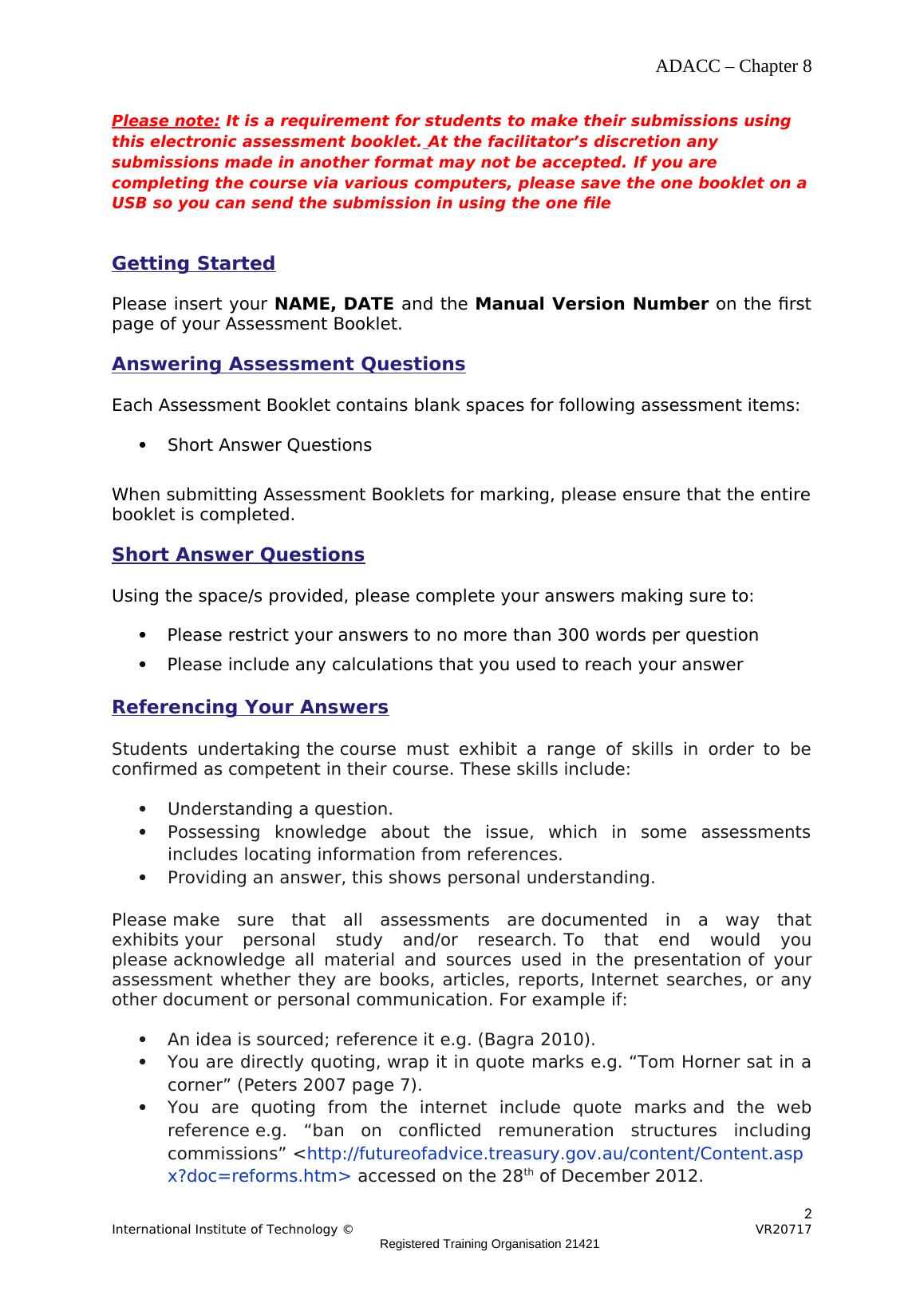
ADACC – Chapter 8
Please note that no more than 5% of direct quoting which is referenced is
deemed to be acceptable and no amount of direct quoting without referencing
is deemed acceptable. Any direct quoting should form only a small portion of any
answer and the answer should demonstrate the student understands and can
interpret the question and provide an appropriate answer.
Whilst this will require more work for you I hope you will understand that we are
trying to maintain high standards and support your progression into further
qualifications.
Document Naming Instructions:
Save this file to your computer and please use the following protocol when
naming the file;
SUBMISSION this relates to the number of times the file has been submitted. For
example, your first submission would be S1, with any re-submission the file
name should be recorded S2.
Note: If you are submitting handwritten assessments all questions must be
completed in blue or black pen. If assessments are received in pencil or with
illegible handwriting, a resubmission will be required.
Note: It is your responsibility as a student to keep a copy of all assessment
submissions. IIT do not take responsibility for the loss of any submissions.
Distance Education Students
3
International Institute of Technology © VR20717
Registered Training Organisation 21421
Please note that no more than 5% of direct quoting which is referenced is
deemed to be acceptable and no amount of direct quoting without referencing
is deemed acceptable. Any direct quoting should form only a small portion of any
answer and the answer should demonstrate the student understands and can
interpret the question and provide an appropriate answer.
Whilst this will require more work for you I hope you will understand that we are
trying to maintain high standards and support your progression into further
qualifications.
Document Naming Instructions:
Save this file to your computer and please use the following protocol when
naming the file;
SUBMISSION this relates to the number of times the file has been submitted. For
example, your first submission would be S1, with any re-submission the file
name should be recorded S2.
Note: If you are submitting handwritten assessments all questions must be
completed in blue or black pen. If assessments are received in pencil or with
illegible handwriting, a resubmission will be required.
Note: It is your responsibility as a student to keep a copy of all assessment
submissions. IIT do not take responsibility for the loss of any submissions.
Distance Education Students
3
International Institute of Technology © VR20717
Registered Training Organisation 21421
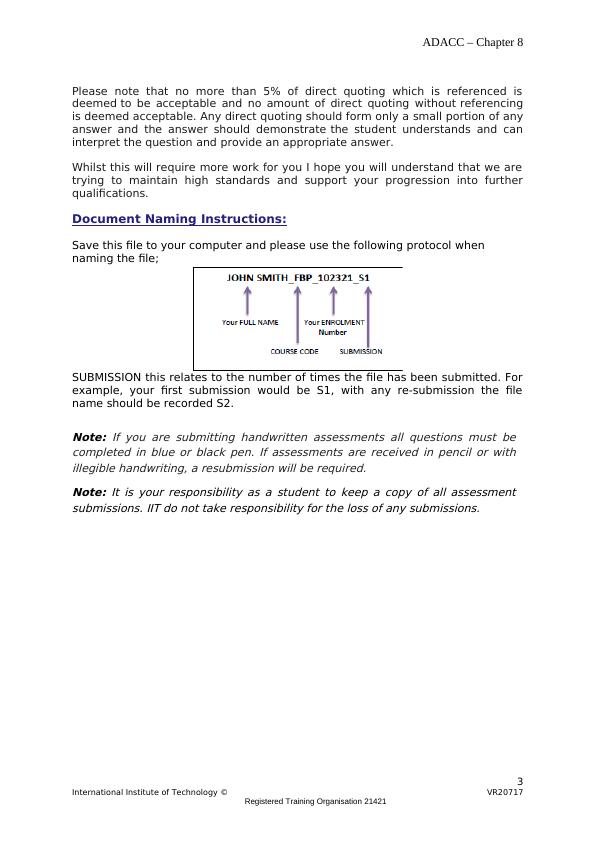
ADACC – Chapter 8
Student Declaration
I understand that by completing this form I am bound by the
following declaration.
To the best of my knowledge and belief, no part of this
assignment for the above unit has been copied from any other
student’s work or from any other source except where due
acknowledgment is made in the text, or has been written for
me by another person.
Name: Date:
4
International Institute of Technology © VR20717
Registered Training Organisation 21421
Student Declaration
I understand that by completing this form I am bound by the
following declaration.
To the best of my knowledge and belief, no part of this
assignment for the above unit has been copied from any other
student’s work or from any other source except where due
acknowledgment is made in the text, or has been written for
me by another person.
Name: Date:
4
International Institute of Technology © VR20717
Registered Training Organisation 21421
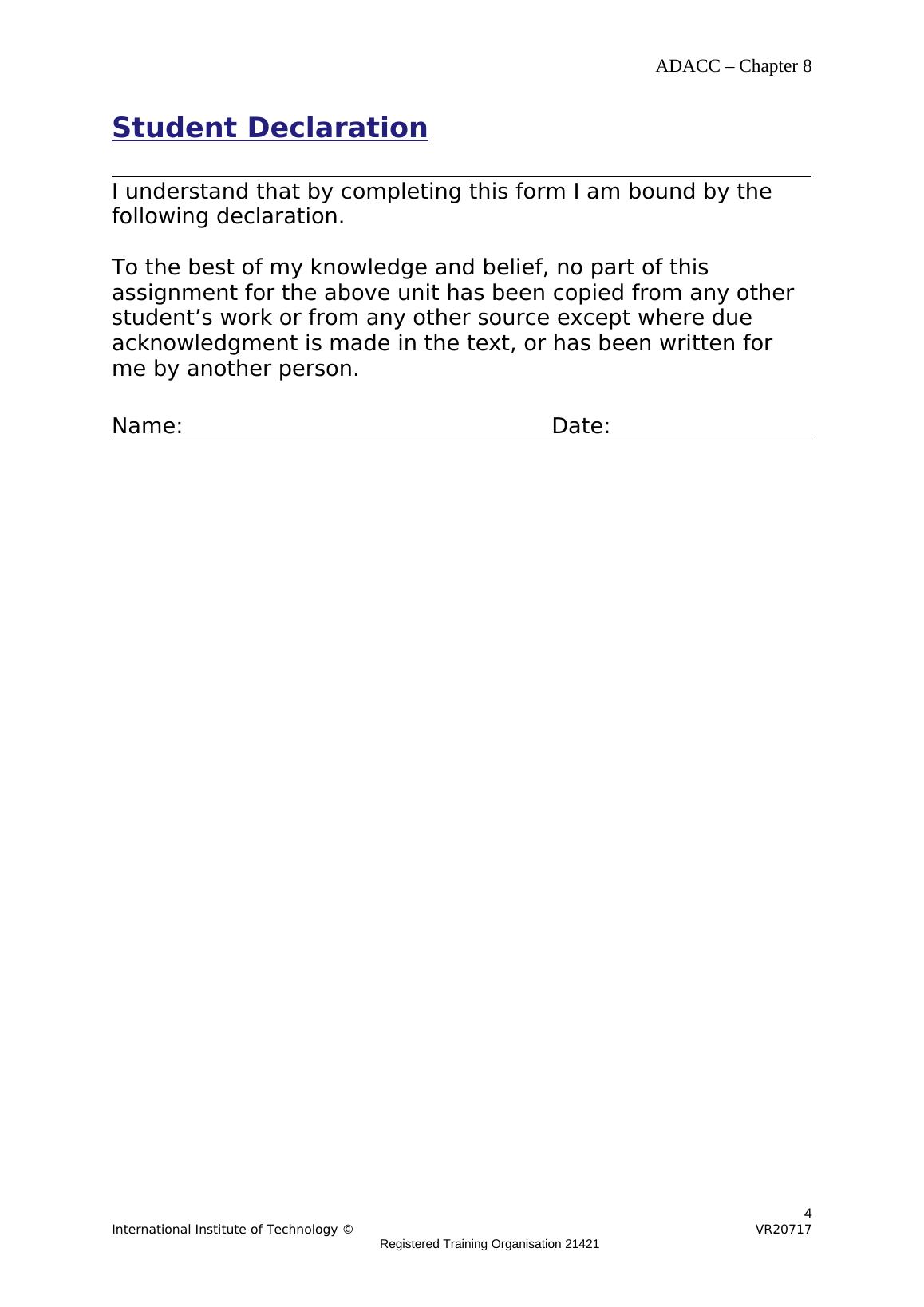
ADACC – Chapter 8
Short Answer Question 1:
Which types of international standard (ISAs, ISREs, ISAEs or ISRSs) apply to the
following type of engagement?
a) An audit of a client’s internal controls
b) Providing an opinion on whether historical financial statements have
been prepared in accordance with an identified financial reporting
framework
c) Providing an opinion on whether the corporate governance
arrangements in a company comply with a specific corporate
governance code
d) Preparing a tax return for a client.
a) For engagement of an auditor for an audit of a client’s internal
controls, the International Standards on Auditing (ISAs) are
applicable.
b) International Standards on Review Engagement (ISREs) is
applicable for engagement of an auditor for providing an
opinion on whether historical financial statements have been
prepared in accordance with an identified financial reporting
framework.
c) International Service Organisation Assurance Standards (ISAEs)
is applicable for engagement of an auditor providing an opinion
on whether historical financial statements have been prepared
in accordance with an identified financial reporting framework.
d) International Standards on Related Services (ISRSs) is
applicable for engagement for preparing a tax return for a
client.
5
International Institute of Technology © VR20717
Registered Training Organisation 21421
Short Answer Question 1:
Which types of international standard (ISAs, ISREs, ISAEs or ISRSs) apply to the
following type of engagement?
a) An audit of a client’s internal controls
b) Providing an opinion on whether historical financial statements have
been prepared in accordance with an identified financial reporting
framework
c) Providing an opinion on whether the corporate governance
arrangements in a company comply with a specific corporate
governance code
d) Preparing a tax return for a client.
a) For engagement of an auditor for an audit of a client’s internal
controls, the International Standards on Auditing (ISAs) are
applicable.
b) International Standards on Review Engagement (ISREs) is
applicable for engagement of an auditor for providing an
opinion on whether historical financial statements have been
prepared in accordance with an identified financial reporting
framework.
c) International Service Organisation Assurance Standards (ISAEs)
is applicable for engagement of an auditor providing an opinion
on whether historical financial statements have been prepared
in accordance with an identified financial reporting framework.
d) International Standards on Related Services (ISRSs) is
applicable for engagement for preparing a tax return for a
client.
5
International Institute of Technology © VR20717
Registered Training Organisation 21421
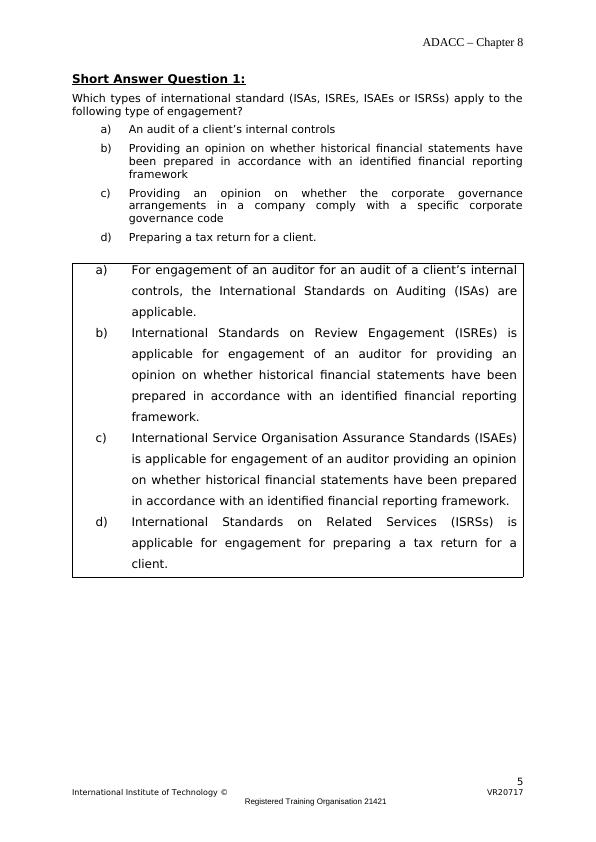
ADACC – Chapter 8
Short Answer Question 2:
Why is it not possible to provide absolute assurance with an assurance
engagement such as an annual audit?
Auditors are engaged for examining the correctness and trueness of the
information provided in the financial statement of an organisation and
making an opinion about the true and fair view of the financial
statement of the organisation. It means, the auditor provides and
assurance about the compliance of various standards in accounting and
reporting financial information of the organisation. Auditors are engaged
for a specified period of time and it is impossible to check all the
financial transactions from its initiation to the completion. Therefore,
they have to check the accounting and reporting of financial information
on a sample basis. An auditor cannot provide an absolute assurance as
the applications of testing and sampling makes the ability of the auditor
to detect material misstatement. Some other factors such as limitation
of the internal control systems, persuasive audit evidences and the
validity of the audit evidence also responsible for making the ability of
the auditor to restrict in providing an absolute assurance.
6
International Institute of Technology © VR20717
Registered Training Organisation 21421
Short Answer Question 2:
Why is it not possible to provide absolute assurance with an assurance
engagement such as an annual audit?
Auditors are engaged for examining the correctness and trueness of the
information provided in the financial statement of an organisation and
making an opinion about the true and fair view of the financial
statement of the organisation. It means, the auditor provides and
assurance about the compliance of various standards in accounting and
reporting financial information of the organisation. Auditors are engaged
for a specified period of time and it is impossible to check all the
financial transactions from its initiation to the completion. Therefore,
they have to check the accounting and reporting of financial information
on a sample basis. An auditor cannot provide an absolute assurance as
the applications of testing and sampling makes the ability of the auditor
to detect material misstatement. Some other factors such as limitation
of the internal control systems, persuasive audit evidences and the
validity of the audit evidence also responsible for making the ability of
the auditor to restrict in providing an absolute assurance.
6
International Institute of Technology © VR20717
Registered Training Organisation 21421
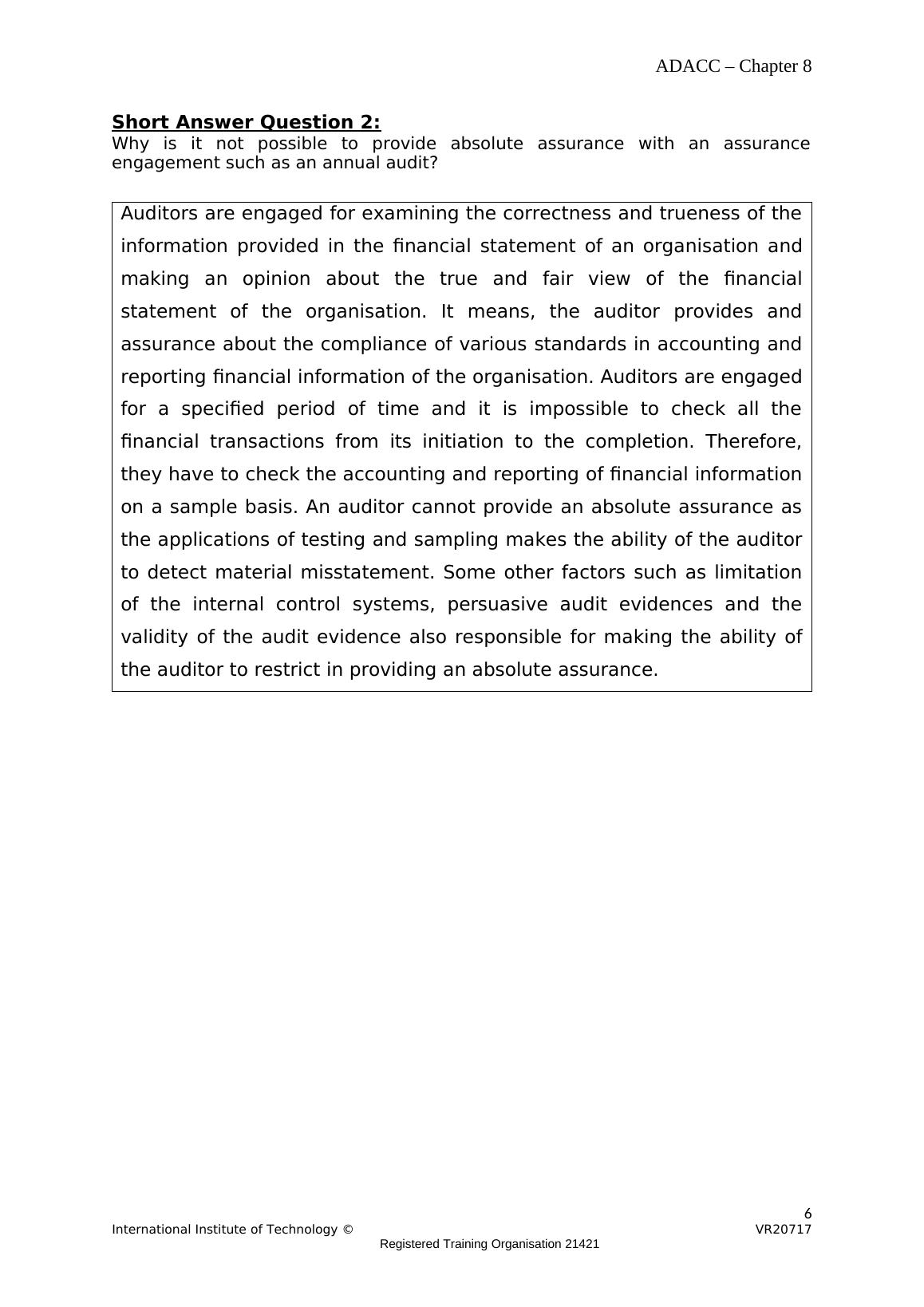
End of preview
Want to access all the pages? Upload your documents or become a member.
Related Documents
Finance Broking in Practice (FBP) Student Assessment Bookletlg...
|24
|4656
|254
The Distance Education Studentslg...
|17
|3797
|20
Accounting for Purchase of New Business - Fred Jones Ltd.lg...
|23
|3447
|34
ADACC – Chapter 11lg...
|26
|5885
|88
ADACC - Chapter 12lg...
|30
|4898
|78
Bridging Gap for FNS50320 Principles of Finance and Mortgage Broking Management (PFMBM) Student Assessment Bookletlg...
|14
|3369
|169
